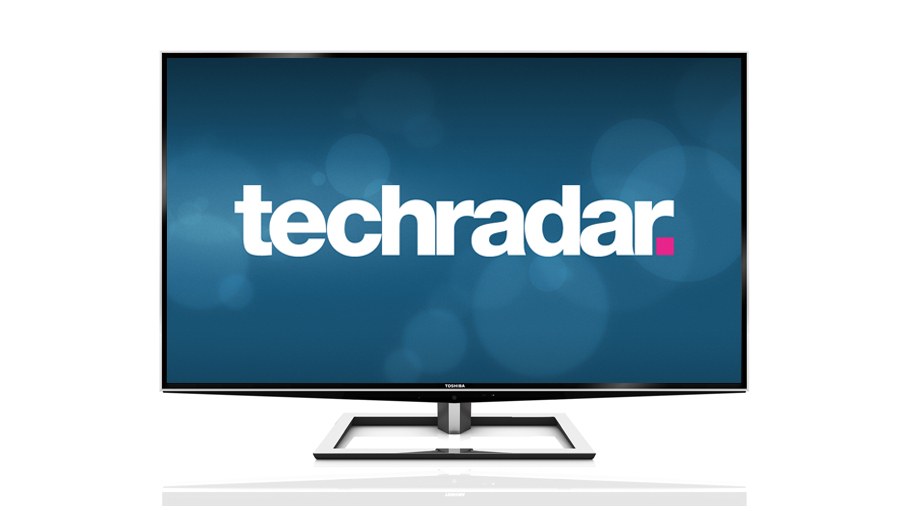TechRadar Verdict
Pros
- +
Attractive design
- +
4K pictures look amazing
- +
HD pictures also great
- +
Very good black levels
Cons
- -
Expensive
- -
4K playback practically impossible
- -
Some light 'boxing'
- -
Flawed 3D playback
Why you can trust TechRadar
Well here's something you don't see every day. A TV that not only enables you to watch 3D without any glasses on, but also sports a native Quad HD or Ultra HD resolution.
In fact, no television before the Toshiba 55ZL2 has been able to offer either of these hugely significant features. So it's fair to say the TV will rightly be looked back on in the years to come as the start of what is looking likely to be a new era in television technology.
It's a pity, then, that the 55-inch Toshiba 55ZL2 arrives with a couple of clouds hanging over it. First there's the fact that when we've seen its glasses-free 3D system in action at numerous technology shows over the past 18 months, it's left us feeling distinctly unimpressed.
Second, it's always seemed - until very recently, at any rate - as if Toshiba's only interest in using a 4K screen was as a means of producing a convincing glasses-free 3D image. So it remains to be seen if the Toshiba 55ZL2 really gets the most out of its 4K talents.
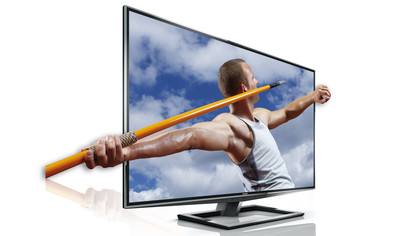
Admittedly 4K is a tricky proposition right now on account of the lack of any 4K source or connection standards. But Sony has managed to get 4K working via a high-powered PC and a normal HDMI port and cabling on its VW1000ES 4K projector, so let's pray Toshiba has done the same with the 55ZL2.
The Edge LED Toshiba 55ZL2 also has Toshiba's Places online system, and its pictures are driven, reassuringly, by Toshiba's ultra-powerful Cevo Engine processing system - a system that worked wonders with the recent Toshiba YL863 and Toshiba WL863 series.
The Toshiba 55ZL2 is the only 4K, glasses-free 3D TV in Toshiba's range right now, and sits miles above (in terms of price as well as spec) the next model down - the aforementioned WL863 and YL863 models.
Although we've tried to come up with a couple of alternative TVs from other brands in the 'Also consider' section at the end of this review, the bottom line is that the Toshiba 55ZL2 is, for now at least, so groundbreaking that it's genuinely unique. But is its uniqueness enough to justify you spending £6,999 (about $11,215) to secure one?
Features
There are four fundamental things you need to know about the Toshiba 55ZL2 right off the bat. First, it's a 55-inch TV. Second, it's the first commercially released TV in the UK to support glasses-free 3D playback. Third, it's the first commercially released TV in the UK with a native 4K resolution of 3840 x 2160 pixels. And fourth, the price of all this startling innovation is a cool seven grand (or about $11,215).
This latter fact will likely make the Toshiba 55ZL2 nothing more than a pipe dream for most people. But its glasses-free 3D and 4K features naturally make it a TV of huge importance and interest from a technical point of view.
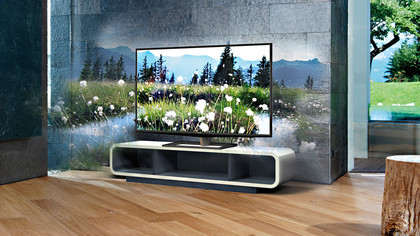
The 55-inch screen for Toshiba's futuristic TV is very pleasantly dressed, thanks to its extremely slender black and silver bezel, plus its unusual but appealing rectangular desktop stand. It sticks out further round the back than most of today's Edge LED TVs, but this seems a minor aesthetic price to pay for the heavy-duty tech tucked inside.
Connections are interesting. Among the standard stuff we'd expect of any self-respecting high-end TV these days are two USBs capable of multimedia playback of film, photo and music files, and a LAN port for either networking your computers to the TV or taking the TV online with Toshiba's Places platform.
There are four HDMIs, too, again as you would expect, as well as a little slot for attaching a D-Sub PC feed via a provided adaptor. What certainly isn't normal, though, is the unique digital serial port input facing straight out of the Toshiba 55ZL2's top rear corner.
4K Quad HD
This digital serial port is there because at the time of writing it's the only way to get native 4K source images into the Toshiba 55ZL2. Unlike the Sony VW1000ES 4K projector, the Toshiba 55ZL2 does not appear to have any support via its HDMI ports for getting 4K in that way.
This is significant, because it means that really there's no way of getting 4K video into the screen at all, unless you use the special Toshiba HDD server supplied exclusively to high-end retailers. The only 4K images a normal person will be able to experience on the TV will be from digital still photographs supplied to the TV via the USB ports.
This is a huge disappointment of course, and may well make you wonder why the heck the screen uses a 4K resolution at all if you can't actually use it properly. But the answer to this lies in the Toshiba 55ZL2's glasses-free 3D capabilities.
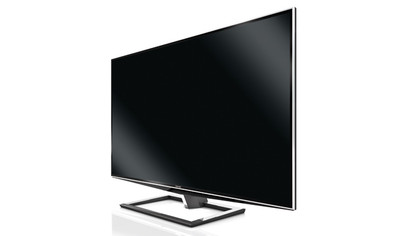
The way the TV uses an array of lenticular lenses to direct different images to your left and right eyes to create a 3D effect means that only a 4K panel has sufficient resolution to deliver glasses-free 3D images that still look anything like HD in resolution.
Given how interest in 3D appears to be waning while interest in 4K is growing fast, Toshiba's decision to apparently focus on 4K resolution as a means to a 3D end rather than as a key feature in itself might seem rather bizarre. However, let's not forget that work started in earnest on the Toshiba 55ZL2 a good 18 months ago, when the short-lived period of 3D fever was at its height and consumers were forever saying they'd only get into 3D properly if they didn't have to wear 3D glasses.
Also, of course, there's the sad but unavoidable fact that 4K sources are about as common as pasta trees. A state of affairs that doesn't look set to change any time soon.
Still, Sony has managed to at least make its VW1000ES projector able to take 4K sources from a massively high-spec PC via HDMI, so it's an almighty shame that Toshiba doesn't seem able to do the same. At least that would have given us leave to talk about the potential for future 4K video content delivery to the Toshiba 55ZL2.
Glasses-free 3D
The glasses-free 3D feature on the Toshiba 55ZL2 needs more explanation. It's already been noted that it uses a lenticular lens system on the TV's screen to deliver the necessary offset images to each eye.
But it should be added that the Toshiba 55ZL2 is able to deliver these offset images not to just one 'sweet spot' but to as many as nine. This is a potentially critical improvement over early glasses-free 3D televisions we've seen, which have only delivered a credible effect from one or maybe two precise viewing points.
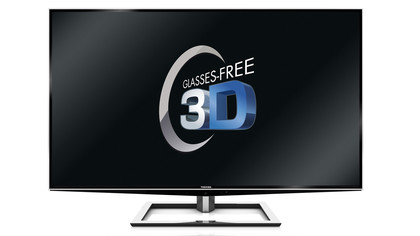
Toshiba even has a tracking system in the Toshiba 55ZL2 whereby a camera built into the TV scans the room for faces and adjusts its viewing sweetspots accordingly. Very clever - and something that's only possible because the 55ZL2 employs Toshiba's powerful Cevo Engine processing.
Image processing
The presence of this processing unsurprisingly filters into numerous other areas of the Toshiba 55ZL2 too. For starters, as with the Toshiba 46YL863, which also uses Cevo Engine processing, you can get your TV to auto-calibrate itself with the help of the TPA-1 colour meter. This plugs into one of the TV's USB ports, so that it can use the measurements it takes from a built-in set of test signals to adjust various aspects of the TV's settings.
There are a couple of problems with the TPA-1, though. First and foremost, it's not included for free with the Toshiba 55ZL2, despite the TV's massive asking price. Instead it costs £200-£250 (around $315-$400) extra. Also, we've found the calibrated pictures the TPA-1 produces to be a little imperfect, leaving reddish tones looking slightly muted and out of balance.
The Cevo Engine system is at play in the Toshiba 55ZL2's general picture processing too, since it powers an 800Hz effect achieved through a combination of a 200Hz native panel, a scanning backlight and frame interpolation.
Perhaps the area where the Cevo Engine will most earn its corn, though, is in its upscaling of normal Full HD and even standard definition sources to the screen's native 4K resolution. This potential for making Blu-rays look even sharper and more detailed than they do on a good Full HD TV is arguably the set's main attraction - unless you're a 3D obsessive - given the set's apparent inability to play native 4K video through any practical channels.
Delivering this upscaling is a turbocharged version of Toshiba's previously acclaimed Resolution+ system, complete with different levels of processing power when it comes to adding sharpness to the image.
The Toshiba 55ZL2's on-screen menus reveal control, too, over the potency of the TV's motion compensation systems; MPEG and standard noise reduction systems; a genre-based set of picture presets including three 'Hollywood' modes; colour and gamma management systems; and something called a Slant Line remover, which proves very good at removing the jaggedness that can appear around upscaled curved edges.
Online content
Wrapping up the Toshiba 55ZL2's potent feature mix is its Toshiba Places smart TV service. This is unfortunately probably the set's most underwhelming attraction, at least when considered against the online services available from other big brands these days.
The problem is that it just doesn't have enough content. Video services aren't too bad, including as they do the BBC iPlayer, YouTube, Acetrax, Viewster, Daily Motion, Box Office 365, Woomi, Cartoon Network and HiT Entertainment - though there's no Netflix or LoveFilm support.
However, while there are a few minor other bits and bobs scattered around the Places services, including Twitter and Facebook support, overall there's just no escaping that you can get way more video, gaming, information and social networking apps from the latest TVs from Sony, Samsung, LG and Panasonic.
John has been writing about home entertainment technology for more than two decades - an especially impressive feat considering he still claims to only be 35 years old (yeah, right). In that time he’s reviewed hundreds if not thousands of TVs, projectors and speakers, and spent frankly far too long sitting by himself in a dark room.
